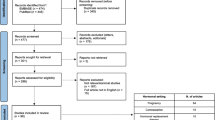Abstract
Sexual hormones have been related to the growth of meningiomas, also due to the almost constant expression of hormonal receptors by tumoral cells. A case of a woman with previous history of multiple treatment for infertility, harboring a huge meningioma is here described. The tumor was surgically resected and the immunohistochemical examination revealed a high expression of progesterone receptors on tumoral cells surface. A putative role of past progesterone administration in the growth of meningioma has been hypothesized. Particular caution should be paid whenever adopting sexual hormonal therapy, especially for fertility. A radiological examination (ideally MRI) could be advised before starting therapy, in order to rule out any intracranial meningioma.


Similar content being viewed by others
References
Cowppli-Bony A, Bouvier G, Rué M, Loiseau H, Vital A, Lebailly P et al (2011) Brain tumors and hormonal factors: review of the epidemiological literature. Cancer Causes Control 22:697–714
Vadivelu S, Sharer L, Schulder M (2010) Regression of multiple intracranial meningiomas after cessation of long-term progesterone agonist therapy. J Neurosurg 112:920–924
Bickerstaff ER, Small JM, Guest IA (1958) The relapsing course of certain meningiomas in relation to pregnancy and menstruation. J Neurol Neurosurg Psychiatry 21:89–91
Chacko JG, Miller JL, Angtuaco EJ (2010) Spontaneous postpartum resolution of vision loss caused by a progesterone receptor-positive tuberculum sellae meningioma. J Neuroophthalmol 30:132–134
Smith JS, Quiñones-Hinojosa A, Harmon-Smith M, Bollen AW, McDermott MW (2005) Sex steroid and growth factor profile of a meningioma associated with pregnancy. Can J Neurol Sci 32:122–127
Jhawar BS, Fuchs CS, Colditz GA, Stampfer MJ (2003) Sex steroid hormone exposures and risk for meningioma. J Neurosurg 99:848–853
Schneider B, Pulhorn H, Rohrig B, Rainov NG (2005) Predisposing conditions and risk factors for development of symptomatic meningioma in adults. Cancer Detect Prev 29:440–447
Speirs V, Boyle-Walsh E, Fraser WD (1997) Constitutive coexpression of estrogen and progesterone receptor mRNA in human meningiomas by RT-PCR and response of in vitro cell cultures to steroid hormones. Int J Cancer 72:714–719
Custer BS, Longstreth WT Jr, Phillips LE, Koepsell TD, Van Belle G (2006) Hormonal exposures and the risk of intracranial meningioma in women: a population-based case-control study. BMC Cancer 6:152–160
Hatch EE, Linet MS, Zhang J, Fine HA, Shapiro WR, Selker RG et al (2005) Reproductive and hormonal factors and risk of brain tumors in adult females. Int J Cancer 114:797–805
Michaud DS, Gallo V, Schlehofer B, Tjønneland A, Olsen A, Overvad K et al (2010) Reproductive factors and exogenous hormone use in relation to risk of glioma and meningioma in a large European cohort study. Cancer Epidemiol Biomarkers Prev 19:2562–2569
Schlehofer B, Blettner M, Wahrendorf J (1992) Association between brain tumors and menopausal status. J Natl Cancer Inst 84:1346–1349
Piper JG, Follett KA, Fantin A (1994) Sphenoid wing meningioma progression after placement of a subcutaneous progesterone agonist contraceptive implant. Neurosurgery 34:723–725
Oura S, Sakurai T, Yoshimura G, Tamaki T, Umemura T, Kokawa Y et al (2000) Regression of a presumed meningioma with the antiestrogen agent mepitiostane. Case report. J Neurosurg 93:132–135
Murata Y, Takeuchi S, Yoshida S, Miyoshi I (2003) Meningioma in a woman receiving hormone therapy. Intern Med 42:1267
Conflict of interest
None.
Author information
Authors and Affiliations
Corresponding author
Rights and permissions
About this article
Cite this article
Frassanito, P., De Bonis, P., Mattogno, P.P. et al. Hormonal therapy for fertility and huge meningioma: a purely random association?. Acta Neurol Belg 112, 299–301 (2012). https://doi.org/10.1007/s13760-012-0046-9
Received:
Accepted:
Published:
Issue Date:
DOI: https://doi.org/10.1007/s13760-012-0046-9




